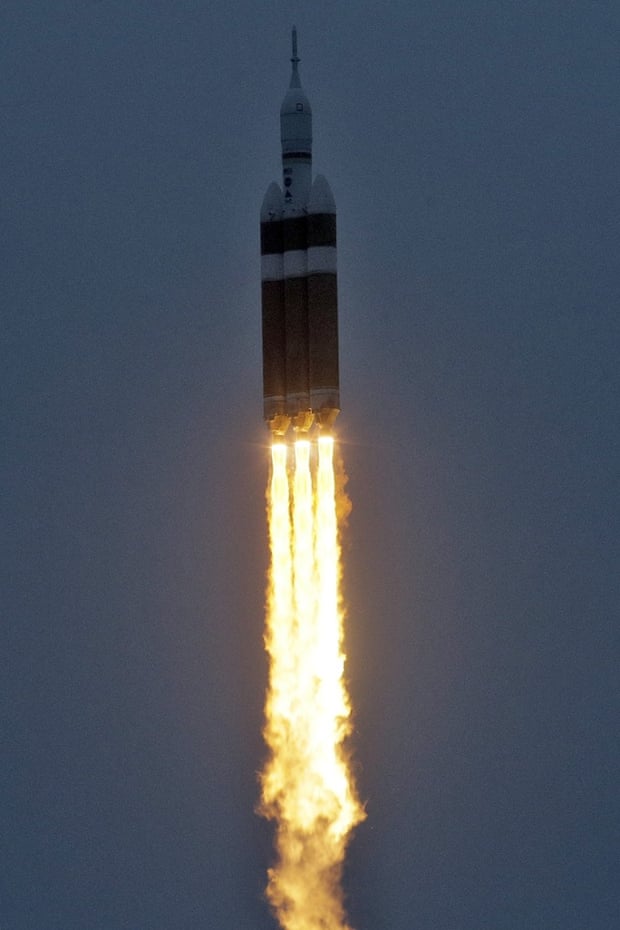
The sight of the Orion spacecraft blasting off this morning - one day late- from Cape Canaveral, was awe inspiring. It brought back the memories of the Apollo launches in the late 60s-early 70s when humanity yet had a vision of manned space exploration. In the intervening decades, of course, that vision was gutted and diminished- mostly by misplaced national priorities and wars of choice (as well as tax, budget cuts). But those of us dedicated to humanity's quest for new worlds, knew that it couldn't persist - we'd be mad to allow it.
True, NASA had to postpone the initial launch on Thursday after a boat entered the launch area, strong winds forced automatic aborts, and two valves failed to close properly. But at no time was I concerned that the launch - when it did occur- would come to perdition like two previous commercial space efforts, including the brutal crash of Virgin Galactic's "Space Ship Two".
But this morning's launch went smoothly, and cameras mounted on the rocket beamed back stunning pictures of the Earth as Orion blasted into the sky. The mission could have huge implications, despite its brief four-and-a-half-hour duration. Orion will fly farther than any spacecraft made for astronauts has in decades, about 3,600 miles (5,800km) above the Earth’s surface, and is a test case for a capsule that NASA hopes will one day land on Mars.
This brings up the question: How long it will be before humans land on Mars? Right now, the projections - despite today's launch- are drawn out with the first manned test launch not for another seven years - or 2022. (NASA has planned a second unmanned flight for 2018, and a manned mission to travel around the moon for the 2020s.) Much of this delay can be placed at the feet of Obama who, in 2010, cut the budget for Orion by 20 percent which resulted in the loss of 600 engineer jobs for the program. The jobs have come back, especially here in Colo. - but the time projection for ultimate landing, say on an asteroid, remains set back 10 years.
That's a long time for space junkies! In the meantime we're supposed to be content with the pathetic, 'small ball' commercial space ventures. Pardon me if I snooze - or at least watch old Star Trek episodes! I really don't give two craps if some celebrity boards the 'Space Ship Two' - assuming Branson finally gets it fixed - to take a five minute junket 28 miles up to the "edge" of space. YAWN!
Meanwhile, the first Mars landing is not expected to occur using Orion until "the 2030s". What!? I'll likely be dead by then! What the hell, I'm supposed to witness this milestone as a freakin' ghost? Of course, there is the suicidal "Mars One" which is supposed to land 4 humans there by 2022- but let's get our heads screwed on straight. That mission is one way only (presumably the cargo will be left a few years earlier for the Mars-o-nauts to construct their prefabs) and the would -be colonists will be left to fend for themselves with no coming back to Earth.
And let's not fool ourselves, there's no assurance the crew will survive for long - assuming they do land safely without adequate redundant systems- given the radiation experienced in transit. (See the paper: ''Measurements of Energetic Particle Radiation in Transit to Mars on the Mars Science Laboratory").
That showed for a 253 day journey from Earth to Mars, radiation levels of up to 0.33 sievert (for one way) would be experienced. And this is likely an underestimate- because it assumes the ultimate standard for current radiation exposure protection - but which the organizers of Mars One would have to plow much more money in to realize. I suspect the actual radiation exposure for the 'Mars One' crew will be twice that amount.
One way or another, however, we have to get to Mars, and we need to colonize it as a first step to interstellar colonization. This is not fantasy or science fiction but hard reality, if we wish our species to survive. (If we don't, then of course it's a moot point.) As Isaac Asimov put it, in his Barbados Queen's Park lecture in February, 1976:
"Manned space exploration is not an option or a luxury. No sane intelligent species in the cosmos willingly leaves all its ‘eggs’ in one basket, in this case on one planet. Any large asteroid, remember, could take us out with one strike. This could happen in 50 years or in 5,000 or 500,000. It doesn’t matter when. It will be the end of humanity if we choose to never explore and disperse ourselves….for our own protection”
Are we smarter than the dinosaurs? Recall they went extinct owing to the Chicxulub impact 65 million years ago. They had no way to prevent their demise, or even detect it in advance. They lacked the brains to do the mathematics for celestial mechanics and the anatomy to construct rockets. We, on the other hand, possess the brains to do both including the ability to compute complex orbits and trajectories as well as design and build rockets. These include providing us with the options to take out an asteroid, or to depart the Earth for new worlds. Or do both! We don't have to be hostage to the inevitability of another monster (Torino scale 10) asteroid strike. The only question remaining is whether we will act in time. Dr. Asimov believed we would, because he had ultimate faith humans would be intelligent enough to do the right thing.
Speaking for myself, I am not so sure.

No comments:
Post a Comment